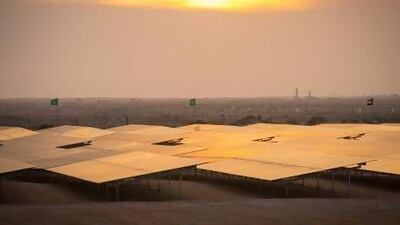ABU DHABI // Irena's presence here is "a global vote of confidence in the UAE's seriousness about clean energy deployment and climate change mitigation", said Dr Sultan Al Jaber, the Minister of State and chief executive of Masdar.
Hosting the headquarters of the International Renewable Energy Agency in Abu Dhabi has increased the UAE's international standing and positively influenced the country's climate change policy, he believes.
"The UAE has distinguished itself as a constructive, progressive voice internationally on climate change, particularly in using renewable energy to reduce carbon emissions," said Dr Al Jaber. "Irena's presence here sends a clear signal to the world that this is a nation that thinks differently and seriously, people all along the political spectrum know they can approach us."
All GCC countries are members of Irena and are actively involved in some of its flagship projects, such as the Global Renewable Energy Atlas, hosted at Masdar Institute.
"Not coincidentally, every GCC country has also set renewable energy targets," said Dr Al Jaber. "Irena has brought new political attention to renewable energy in the Middle East; it brings the global conversation and momentum into our homes and gives us real ownership in renewable energy's advancement."
Dr Thani Al Zeyoudi, director of energy and climate change at the Ministry of Foreign Affairs, believes renewable energy is one of the key elements in the UAE's climate change policy. Investing in renewable energy is also a way to diversify the nation's economy and maintain its position as an energy leader.
"We have been for a while one of the energy leaders whenever it comes to hydrocarbons, and we would like to ensure that we maintain our leadership in the energy sector by heavily involving the renewable energy sector", said Dr Al Zeyoudi. "Through Irena, we are bringing people here, showing them what the UAE is doing."
Besides upgrading its own renewable energy capacity, the UAE is promoting clean energy projects abroad, says Dr Al Zeyoudi.
As part of its bid to host Irena, the country had offered US$350 million (Dh1.28 billion) over seven years, through the Abu Dhabi Fund for Development, for renewable energy projects in developing countries.
This year, 80 applications for funding were submitted by governments through the Irena website.
Now 16 candidates have been shortlisted and are being evaluated by a panel of experts and an advisory committee, elected by the Irena Assembly.
The funding is given in the form of concessional loans after a final review by the Abu Dhabi fund. The first $50m is expected to be awarded by the end of the year.
In addition, $50m is allocated for clean-energy projects in small island states in the Pacific Ocean, which are expected to be among the worst-affected by changes in the climate - and $5m has already been allocated to a solar project in Tonga, being implemented by Masdar and expected to be commissioned by the end of the year.
Through Masdar, the UAE is involved in the London Array, the world's largest offshore wind farm. In April, the 15-megawatt Sheikh Zayed Solar Plant officially opened in the Islamic Republic of Mauritania.
Masdar is also working on projects in Afghanistan and the Seychelles.

